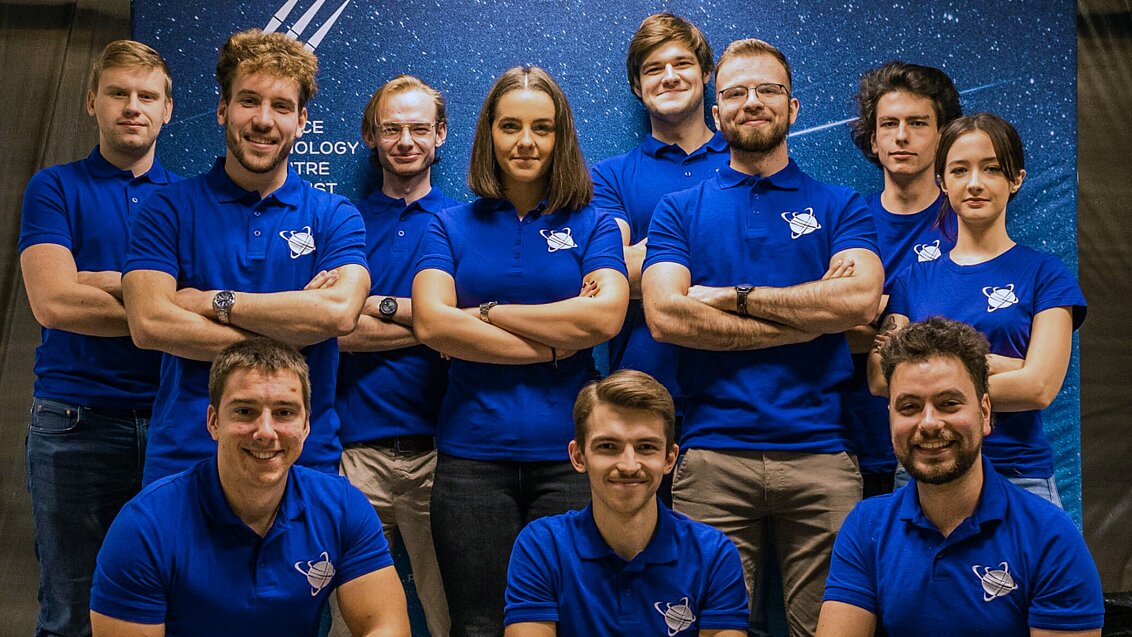AGH on its way to the Moon – the university has signed an agreement with Orbital Space
AGH University of Krakow has entered into a cooperation agreement with Orbital Space, a company based in the United Arab Emirates. The agreement allows students from Krakow to develop and test the "Lunaris" device, designed for studying the interaction of selected materials and coatings with lunar dust - regolith.
The signed agreement is a result of the success of the AGH Lunar Technologies student group, which won the competition titled "Experiment on the Moon: Lunar Payload Mission" organized in May 2023 by Orbital Space, surpassing over 400 projects from around the world. The main prize includes the opportunity to send the designed device to the Moon in 2025, with the flight ensured by Orbital Space. This will be the first mission of its kind with a payload constructed by a Polish team and one of the first collaborations between Poland and the United Arab Emirates in the space sector.
To enable students to develop and refine the project until the launch, AGH University of Science and Technology in Krakow has signed a cooperation agreement with Orbital Space, the organizer and sponsor of the competition. The course of the agreement and cooperation with the company will be coordinated by the Center for Space Technologies.
"We strongly support all initiatives of this kind by students. They are crucial not only from an educational perspective but also significant for the participation of Polish engineers and scientists in space exploration. In line with our mission, we provide substantial technical support, facilitate contact with companies interested in sponsoring the project, and assist in preparing all mission-related documents," explains Prof. Tadeusz Uhl, Director of the Center for Space Technologies.
Dr. Bassam Alfeeli, Director of Orbital Space, adds:
"We are excited about collaborating with AGH. We will support the student team from Poland in realizing their dreams. Both of our institutions also commit to providing mentoring, guidance, and all possible support to students in their unique mission of sending a payload to the surface of the Moon. Orbital Space's mission is to make space accessible to everyone, especially students."
The collaboration between AGH and Orbital Space also includes activities such as educational initiatives and efforts to raise public awareness about space exploration. The agreement also allows for the possibility of co-organizing workshops, webinars, conferences, student competitions, or courses related to the application of space technologies.
Lunaris – will fly to the Moon in 2025
The primary goal of the agreement is to develop the students' experiment "Lunaris," which will be conducted on the surface of the Moon. The members of the student group aim to study the interaction of materials and coatings with regolith, the loose lunar rock. In addition to construction, utilizing rapid prototyping techniques, the students have developed the electronics and software for the device. The final payload also had to meet requirements for dimensions (10 x 10 x 10 cm) and weight (up to 200g).
An optical measurement method will be used for the study, allowing an understanding of the interaction between regolith and various materials. Regolith is characterized by high dustiness, sharp edges, and electrostatically charged particles. These properties of lunar dust pose challenges in selecting suitable materials. Lunaris will be one of the first lunar payloads produced using 3-D printing technology, allowing for geometry that would be difficult to achieve with other methods. The device will be made from a material adapted to the extreme conditions of space.
The project's name, "Lunaris," is a combination of words. The first part is the Latin word "luna," meaning the Moon. The second part is a nod to the inspiring work of Stanisław Lem and his most famous novel, "Solaris." Research on the interaction of materials with regolith is crucial for future lunar exploration missions. The results of the "Lunaris" project may find applications in the construction of tools, astronaut suits, cables, and connectors used on lunar landers and rovers, which need to withstand contact with the lunar surface.
Orbital Space
Orbital Space, a technological company based in the United Arab Emirates, is involved in space exploration and the development of related technologies. It is preparing the first private lunar mission for 2025 initiated by Arab countries. Focusing on space missions and scientific research, Orbital Space leads commercial space exploration in the Gulf countries, collaborating with both public and private partners. Its mission is to support academic teams in space research.
AGH Lunar Technologies:
-
Facebook (link)
